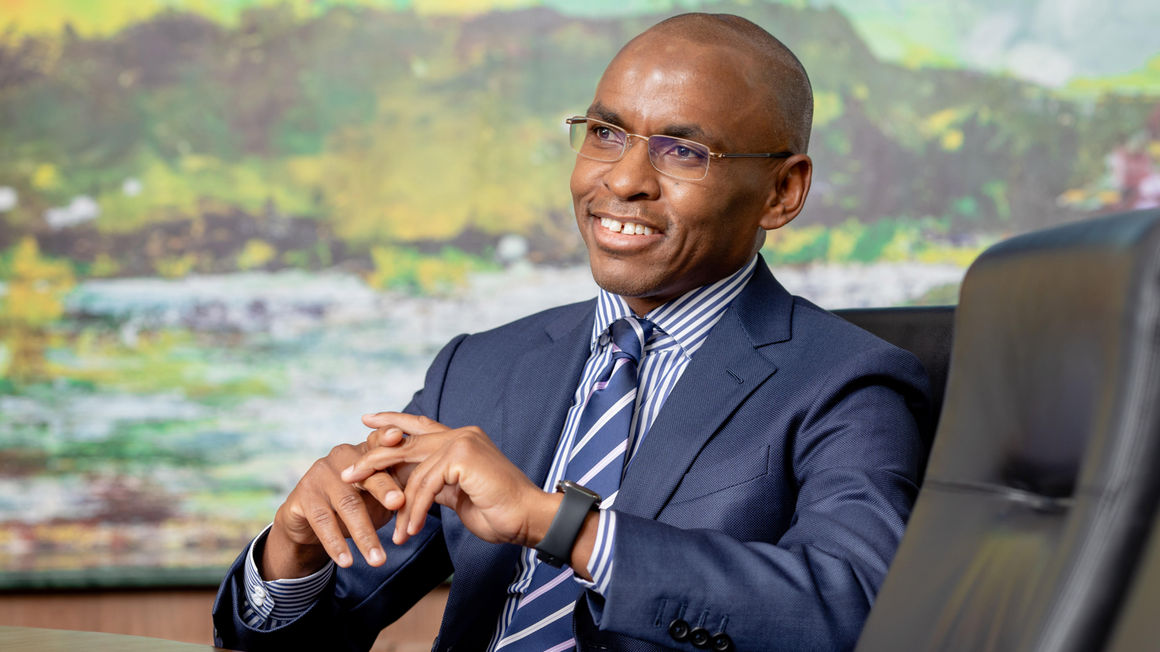
Safaricom CEO Peter Ndegwa. PHOTO | POOL
Standard Chartered Bank Kenya was one of the major banks that lent Safaricom a total of ...
$400 million (Sh46.3 billion) last year, helping the telecom operator pay for its Ethiopian licence.A consortium led by Safaricom paid $850 million (Sh98.3 billion) to gain entry into the new market, with the telco relying heavily on short-term loans to fulfil its part of the capital obligations.
“We led a landmark financing for a telecommunications client in the East African region. This was the largest loan syndication to the tune of $400 million,” StanChart says in its latest annual report.
“The $400 million facilities comprised of a short-term stand-by letter of credit and a 12-month term loan which allowed the consortium to submit and fund the winning bid for the first full-service mobile telecommunications licence for a private sector operator in Ethiopia.”
StanChart did not disclose the other banks with which it worked to fund Safaricom. The other lenders could include its London-based parent company Standard Chartered Plc and local big banks.
The telco had earlier separately disclosed the short-term loans without identifying the banks, adding that it was negotiating to convert them into long-term borrowings to free its cash flow.
“To support the payment of licence fees for the telecommunications licence awarded to the Safaricom-led consortium by the Government of Ethiopia, we undertook a one-year bridge facility of $400 million to finance this venture,” Safaricom said when it announced its results for the half-year ended September.
“We are currently seeking to term out the bridge facility through a long-term arrangement so as to manage our working capital requirements in the short term and minimise the currency risk for the dollar loan.”
Converting the loan into a long-term facility will generate substantial interest income for the banks which would otherwise need to look for another borrower to lend to.
The pricing of the loan has not been disclosed but dollar facilities typically attract interest rates in the mid-single digits.
For Safaricom, the extension of the maturity period has saved it from a major repayment headache at a time when the weakening of the shilling has inflated the dollar-denominated debt.
The telco earns most of its revenue in Kenya shillings and this is the biggest loan it has ever taken in hard currency, raising its total debt burden.
The shilling has depreciated 6.9 percent in the past 12 months to trade at 115.7 units to the dollar. Safaricom’s total bank borrowings rose to a record Sh76.9 billion in the half-year ended September, underlining the impact of the $400 million syndicated loan.
The company’s debt increased 5.2 times from Sh14.7 billion a year earlier, making it one of the biggest corporate borrowers alongside others such as KenGen , Kenya Airways , and Kenya Power .
Safaricom noted that it held cash and cash equivalents of Sh26.4 billion in the review period, placing its net debt at Sh50.5 billion.
In its early life as a publicly-traded company, the telco used to fund its growth through debt, but it weaned itself off medium to long-term debt as its cash generation exceeded reinvestment needs.
The Ethiopian venture, however, requires major investment which will see Safaricom further increase its borrowings given its role as the major shareholder of the new business with a 55.7 percent stake.
Out of the Sh76.9 billion borrowing, Sh62.2 billion is in the form of short-term debt.
Safaricom said it is investing an initial $600 million (Sh69.4 billion) in Ethiopia as part of its contribution to the consortium’s total investment pledge of $8 billion (Sh926 billion) over 10 years, excluding the cost of the licence.
It remains to be seen whether the telco will change its dividend policy as a result of the huge capital requirements in the Ethiopian venture.
Safaricom has been distributing at least 80 percent of its net income to shareholders, leaving the remaining 20 percent for reinvestment in infrastructure and retained earnings, which now stand at Sh133.7 billion.
The telco could tap the retained earnings to partially fund its Ethiopian commitments.
Safaricom says it will fund the Ethiopian investment through its own funds and loans from local banks and development finance institutions.
“We are expecting a capital expenditure of between $1.5 billion (Sh173 billion) and $2 billion (Sh231 billion) over the next five years to meet the licence coverage obligations,” Safaricom’s chief executive, Peter Ndegwa, said earlier of the initial Ethiopia investments by the consortium.
The telco’s need to borrow more funds long-term is set to benefit local banks.
The major borrowers offer banks an opportunity to make a few big loans in local currency as well as dollars, diversifying their loan portfolios.
Most of the borrowings are, however, expected to be sourced from sovereign wealth funds and development finance institutions, which have much deeper pockets and can lend over periods lasting more than a decade.
The consortium had sought a $500 million (Sh57.8 billion) loan from the US International Development Finance Corporation (DFC). The American State agency has, however, delayed the disbursement of the funds, citing uncertainty over the ongoing unrest in Ethiopia.
vjuma@ke.nationmedia.com

No comments:
Post a Comment